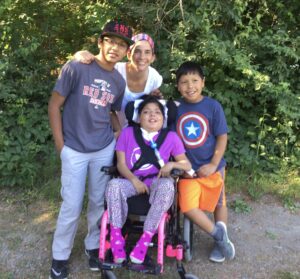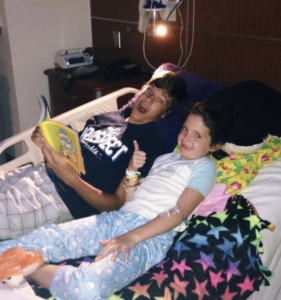Siblings
Your child’s illness journey will be a defining feature of their siblings’ lives. While there will certainly be challenges, with adequate support many siblings develop a deep sense of compassion, caring, and understanding through their experience. Modeling healthy expressions of emotion will help your children learn that you are open with your feelings and that you welcome their expressions of feelings also.

Your Team:
A member of the clergy who is responsible for the religious needs of an organization and/or its constituents.
A mental health professional who specializes in bereavement and loss.
A specialist whose aim is to improve the quality of life of their patients over the course of their illness regardless of stage, by relieving pain and other symptoms of that illness.
A medical professional who practices general medicine.
A mental health professional who uses therapy and other strategies to support coping and adjustment and treat concerns regarding social, emotional, or behavioral functioning.
A trained professional who works with people, groups and communities to help them better their lives.
An individual who leads and/or guides individuals or groups coping with life experience and challenges.
An educator.
A person trained to care for the sick, especially in a hospital.
A person who gives help and advice to students about educational and personal decisions.
A psychologist, social worker, chaplain, grief counselor, spiritual leader and/or palliative care provider can help identify issues and help you prepare your responses. A child-life specialist can help create moments of connection for the family. Your child’s primary physician knows the family and can offer insight and resources. A teacher, guidance counselor, school nurse or other trusted school staff member can support siblings and be an important point of contact for you.
Communicating with Siblings
Be aware that children take their cues from the adults around them. They often sense sadness, tension, or worry, even when it is not spoken. You may worry that introducing certain topics or expressing your own feelings will cause siblings to experience unnecessary distress. It’s important to respond to their questions as fully and truthfully as possible, in a way that is developmentally appropriate. Remember, too, that it is okay to be honest about not knowing answers. Your honesty will help create understanding and strengthen their trust in you and your bond with them.
– Jenn, parent of Mallory
Making Time
Common Sibling Responses
It is important to keep in mind that how children respond depends largely on their age and level of maturity. Some common experiences are noted below and described in detail in the CPN guide “Helping Children Cope with a Sibling’s Serious Illness.”
- Feeling abandoned or invisible
- Jealousy
- Guilt … or relief
- Pressure to achieve or be perfect
- Wanting to be involved
- Acting out
- Fear of the future
- Feeling alone or isolated
- Embarrassment
Siblings at End of Life
Related Resources
-
 A little brother with Trisomy 18 and how the siblings cope.video
A little brother with Trisomy 18 and how the siblings cope.video -
 Why Show and Tell is Important in the Face of a Devastating Diagnosis: Helping Siblings UnderstandBLOG
Why Show and Tell is Important in the Face of a Devastating Diagnosis: Helping Siblings UnderstandBLOG -
 Communicating with the siblings: What can we do to make this as less traumatic as possible, to minimize damage.video
Communicating with the siblings: What can we do to make this as less traumatic as possible, to minimize damage.video -
 Supporting Siblings Through a Serious Medical Condition: What to Say Infographicguide
Supporting Siblings Through a Serious Medical Condition: What to Say Infographicguide -
 Educating others to talk openly and honestly about illness and death: When you share the unbearable, it becomes bearable.video
Educating others to talk openly and honestly about illness and death: When you share the unbearable, it becomes bearable.video -
 No Sign of a SignBLOG
No Sign of a SignBLOG -
 Helping Children Cope with a Sibling's Serious Illnessguide
Helping Children Cope with a Sibling's Serious Illnessguide